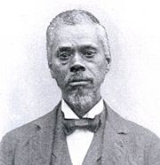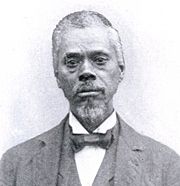
Wilson Caldwell
Encyclopedia

American Civil War
The American Civil War was a civil war fought in the United States of America. In response to the election of Abraham Lincoln as President of the United States, 11 southern slave states declared their secession from the United States and formed the Confederate States of America ; the other 25...
-era African American
African American
African Americans are citizens or residents of the United States who have at least partial ancestry from any of the native populations of Sub-Saharan Africa and are the direct descendants of enslaved Africans within the boundaries of the present United States...
. Born into slavery on February 27, 1841, his mother was Rosa Burgess, a slave of the University of North Carolina
University of North Carolina at Chapel Hill
The University of North Carolina at Chapel Hill is a public research university located in Chapel Hill, North Carolina, United States...
President David Swain. His father was November 'Doctor' Caldwell, a slave of Joseph Caldwell
Joseph Caldwell
Joseph Caldwell was a U.S. educator, Presbyterian minister, and mathematician. He was the first president of the University of North Carolina at Chapel Hill, holding the office from 1804 until 1812, and from 1816 until his death in 1835...
. Children born to slave mothers were the property of the mother's master, so that Wilson Caldwell was owned by Swain at birth, and was named Wilson Swain until Emancipation, at which point he took his father's last name.
Wilson Caldwell grew up alongside the son of David Swain, Richard Caswell Swain (1836-1872), whereby Caldwell received some education—a rare opportunity for slaves at that time. Caldwell was not treated as a slave but as playmate and part of the family (Walbert, 1995).
Wilson Caldwell was for many years head janitor at the University. He was a key member of a delegation that persuaded Union armies to spare the University during the Civil War, a time when many Southern cities were being burned to the ground. Fleeing the approach of Union troops, a small detachment of Confederate cavalry entered Chapel Hill on April 14, 1865. They intended to protect the University but continued to retreat after a two-day pause. Lacking further defenses, Chapel Hill citizens resolved to save the town by surrendering peacefully. Wilson Caldwell walked out with University President Swain, Judge W. H. Battle and others to the "foot of Piney Prospect to meet the incoming detachment of [General Hugh Judson Kilpatrick
Hugh Judson Kilpatrick
Hugh Judson Kilpatrick was an officer in the Union Army during the American Civil War, achieving the rank of brevet major general. He was later the United States Minister to Chile, and a failed political candidate for the U.S...
's] cavalry, in order to claim protection for the town and the University." The presence of a leader from Chapel Hill's Black community was an important factor, and their request for protection "was promptly granted" (Battle, 1895).
After the Civil War Caldwell took advantage of the new freedoms afforded to former slaves. He founded a school for African Americans in 1868, was elected to the board of Commissioners of Chapel Hill, bought over 12 acres (48,562.3 m²) of land, and served as a Justice of the Peace
Justice of the Peace
A justice of the peace is a puisne judicial officer elected or appointed by means of a commission to keep the peace. Depending on the jurisdiction, they might dispense summary justice or merely deal with local administrative applications in common law jurisdictions...
. He returned to work at the University in 1884 and remained head of the campus workforce until his death.
Wilson Caldwell was married to Susan Kirby. They had twelve children, of whom five died in childhood from pneumonia, and two others predeceased their parents. Caldwell died in 1898 and is buried at the University of North Carolina cemetery, beside his father, November Caldwell, and his son, Doctor Edwin Caldwell
Edwin Caldwell
Dr. Edwin Caldwell Dr. Edwin Caldwell Dr. Edwin Caldwell (August 12, 1867 in Chapel Hill, North Carolina - 1932 discovered one of the first effective treatments for pellagra.His grandparents were slaves. His father was Wilson Caldwell and his mother was Susan Kirby. The grandparents on his...
. The UNC class of 1891 had a monument placed on his grave, a large sandstone
Sandstone
Sandstone is a sedimentary rock composed mainly of sand-sized minerals or rock grains.Most sandstone is composed of quartz and/or feldspar because these are the most common minerals in the Earth's crust. Like sand, sandstone may be any colour, but the most common colours are tan, brown, yellow,...
obelisk
Obelisk
An obelisk is a tall, four-sided, narrow tapering monument which ends in a pyramid-like shape at the top, and is said to resemble a petrified ray of the sun-disk. A pair of obelisks usually stood in front of a pylon...
once used to honor University president Joseph Caldwell
Joseph Caldwell
Joseph Caldwell was a U.S. educator, Presbyterian minister, and mathematician. He was the first president of the University of North Carolina at Chapel Hill, holding the office from 1804 until 1812, and from 1816 until his death in 1835...
.

